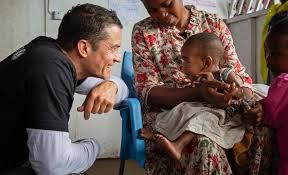
As violence escalates and millions of people continue to be displaced in eastern Democratic Republic of Congo (DRC), grave violations against children are reaching an all-time high, said the UN Children’s Fund (UNICEF) on Wednesday.
UNICEF Goodwill Ambassador Orlando Bloom visited the region for the first time this week to see the dire conditions there for himself.
“The staggering scale of the conflict in eastern DRC, the horrific level of violence and its devastating impact on the children and women I met is heart-wrenching,” said Mr. Bloom.
“No child should live in the dire conditions I witnessed in displacement camps, separated from their families, hungry, unable to go to school and constantly at risk of sexual abuse, violence and exploitation.”
The ongoing conflict in the DRC stems from years of strife between a plethora of non-State armed groups, most significantly the M23 and so-called Allied Democratic Forces (AFD).
The conflict has led almost seven million people to be displaced, a 25 per cent increase in 2023. There are 25.4 million people that need humanitarian assistance, the largest number in any country globally in 2024.
Children and women are disproportionately impacted by the conflict. Following the Hollywood actor’s trip to a displacement site, he made a plea for far more humanitarian support in the conflict-ravaged region.
Impact on children
The UN has verified over 1,000 grave human rights violations against children in the three eastern provinces of Ituri, North Kivu and South Kivu during the first quarter of this year, 30 per cent higher than the last quarter of 2023.
“It’s a heartbreaking reality that children caught up in the conflict face abduction, recruitment and use by armed groups, violence and abuse, and we know the reports we have are only the tip of the iceberg,” said UNICEF’s DRC Representative Grant Leaity.
The UN children’s agency called on the parties to this conflict to end grave violations against children and for perpetrators to be held accountable.
Support from UNICEF
Mr. Bloom visited a UNICEF-supported child-friendly space in the Bushagara displacement site, a safe environment where children can engage in supervised recreation and receive psychosocial support. Despite the constant threat of violence still permeating the area, he said he had witnessed a glimmer of hope.
“In these UNICEF-supported spaces, I saw hope as girls and boys found a place where they felt safe, where they could receive psychosocial support, dance and play and enjoy being children.”
Over the last year, UNICEF has also reunited more than 9,000 children in eastern DRC with their families or placed them with temporary foster families. They have assisted more than 400,000 children, adolescents and caregivers with mental health and psychosocial support.
Gender dimensions
Gender and conflict-based sexual violence against women and children remained high in 2023 and has further increased this year.
Mr. Bloom met survivors of sexual violence at the Panzi Hospital and Panzi Foundation in South Kivu during his visit, noting that the harrowing stories shared were “utterly devastating”. However, Mr. Bloom saw first-hand the difference that dedicated support can make.
“Support, including healthcare, psychological support and legal assistance, is helping survivors find the strength to rebuild their lives, but more needs to be done to protect every girl and woman,” said Mr. Bloom.
Humanitarian needs growing
In eastern DRC, around five million people, including 2.8 million children, urgently need humanitarian assistance. UNICEF is providing education, health and psychosocial support. The agency is also providing water and sanitation services and protection assistance for children, women and families affected by the conflict. However, the agency’s humanitarian appeal for $804.3 million is only 10 per cent funded.
“Every day, children and women in the DRC’s displacement camps face tremendous hardships. Their needs are overwhelming, and the response to the crisis is falling short. We must urgently unite to ensure they live in safety and dignity,” said the Goodwill Ambassador.
Source: UN News
https://news.un.org/en/story/2024/06/1150681
 FR
FR EN
EN AR
AR








